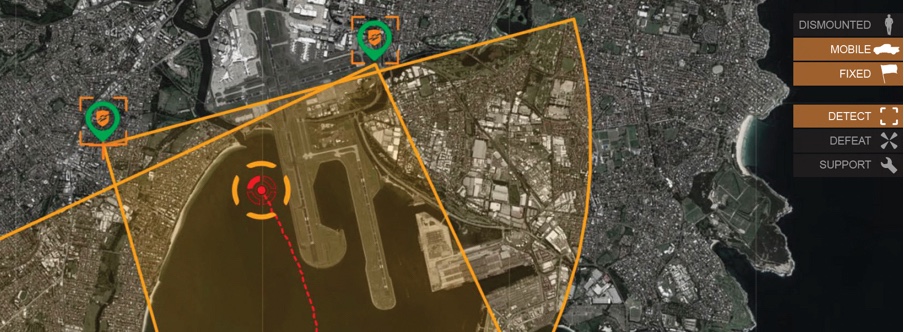• DroneShield launches SensorFusionAI (SFAI), a sensor-agnostic, 3D data fusion engine for complex environments
• Currently deployed as a module in DroneSentry-C2, DroneShield’s Command-and-Control (C2) system
• This launch enables SFAI as a standalone module which can integrate into third party C2 systems on SaaS basis, providing smart fusion capability from diverse sensor arrays

DroneShield (“DroneShield” or the “Company”) is pleased to launch SensorFusionAI (SFAI), a sensor-agnostic, 3D data fusion engine for complex environments.
Angus Bean, DroneShield’s CTO, commented “Detection of drones or Unmanned Aerial Systems (UAS) is moving towards multi-sensor approach for fixed site (and in certain situations, vehicle and ship systems) where the space and budget allows for such approach, due to ability to provide better detection results with multiple sensor modalities, such as radiofrequency, radar, acoustic and camera systems, either deployed in a single or across multiple nodes.”
“However the multi-sensor approach only generates better results, with an intelligent software engine to fuse together the sensor outputs and give an intelligent set of outputs – otherwise adding more sensors is counterproductive as it creates more data without a clear way to manage it.”
DroneShield has developed a true AI-based sensorfusion engine, initially for its own DroneSentry-C2 command-and-control system, including all common drone detection modalities (RF, radar, acoustics, camera).
This separation enables third party C2 manufacturers (including primes) to add SFAI to their C2 systems, on a subscription basis (SaaS), thus improving the performance.
Oleg Vornik, DroneShield’s CEO, added “DroneShield seeks to be both the complete supplier of C-UAS solutions where possible, or a subcontractor where it makes sense. There will be numerous situations globally where the customer has an existing preference for another C2 supplier, based on their existing relationships or other requirements. Providing SFAI to such third party suppliers, maximises our market share and further monetises the IP that we have developed.”
Key feature of SFAI include:
• Behaviour Analysis – Track an object to determine classification and predict trajectory.
• Threat Assessment – Intelligently determine threat level based on a wide range of data types.
• Confidence Levels – Designed for complex, high noise environments, with inconsistent data inputs.
• After-Action Reporting – Sophisticated analytics presented in easy to interpret graphical dashboards.
• Edge Processing – Utilises an edge processing device (SmartHub) for reduced network load and high scalability.
• Versatile Adaptable Inputs – New sensors use existing software adaptors to improve integration time.
• Output to Any Platform – Visualisation on DroneSentry-C2 or third-party C2 platforms, data analysis, alert systems or security management software.
SFAI has significant advantages over traditional multi-sensor C2 engines, whereby system sensors are utilised for their strengths with their weaknesses offset by the strengths of sensor types:
• System intelligently builds a model informed by all inputs over time.
• Confidence values allow for soft sensitivity selection, reducing false positives or false negatives.
• Prediction model can interpolate paths for consistent tracking even with sparse data.
• Any incomplete or contradictory data mediated by comprehensive object model.
• All sensor data fused into one consistent intelligence packet.

